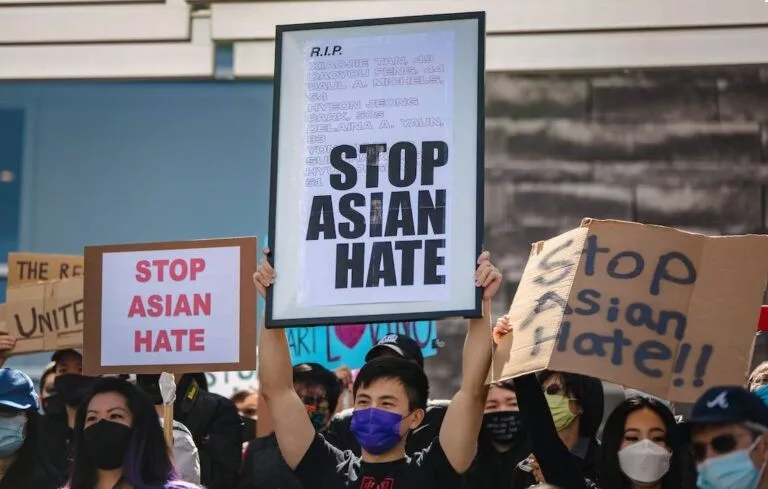July 2023 | By Greg Hugh
Violence against Asian Americans across the U.S. is getting more attention and media coverage now because these incidents are increasing in both number and severity. The Stop AAPI Hate Project estimates that there have been roughly 3,800 anti-Asian bias incidents (PDF) since March 2020, and this number is almost certainly an undercount. These incidents include everything from shunning (i.e., the deliberate avoidance of Asians and Asian Americans) to verbal harassment to, in their most tragic and horrifying forms, physical attacks. The shootings at three Atlanta-area spas that resulted in the deaths of eight people—six of whom were Asian women—are only the tip of a very big and very ugly iceberg.
Unfortunately, Asian immigrants were never treated fairly in the U.S. and historically this has been documented by the treatment of the early arrival of Chinese laborers during the 1850s and the Chinese Exclusion Act plus the internment of ALL Japanese during World War II. This history is not taught in public schools the way it could be. Although Anti-Asian violence has surged in the US since COVID-19 it didn’t start there.
According to the FBI’s 2020 Hate Crime Statistics report, there were 279 anti-Asian hate crimes reported to law enforcement agencies across the United States. This represents a 73% increase from 2019, when there were 161 anti-Asian hate crimes reported.
The Center for the Study of Hate and Extremism at California State University, San Bernardino, released a report in January 2023 that found that anti-Asian hate crimes increased by 339% nationwide in 2021. The report also found that New York City, San Francisco, and Los Angeles had the highest rates of anti-Asian hate crimes in the country.
A report by Stop AAPI Hate, a national coalition tracking anti-Asian hate incidents, found that there were over 10,900 anti-Asian hate incidents reported in the United States from March 19, 2020 to December 31, 2021. This represents a significant undercount, as many incidents go unreported.
These statistics are alarming and show that anti-Asian hate is a serious problem in the United States. It is important to raise awareness of this issue and to work to address the root causes of anti-Asian hate.
Here are some things you can do to help:
Educate yourself about anti-Asian hate and its history.
Talk to your friends and family about anti-Asian hate and how to combat it.
Report any anti-Asian hate incidents you see or experience to the police.
Support organizations that are working to combat anti-Asian hate.
We can all play a role in making our communities more inclusive and safer for Asian Americans and Pacific Islanders.
Manju Kulkarni, who co-founded Stop AAPI Hate in 2020 with fellow civil rights activists Cynthia Choi and Russell Jeung, told Ethnic Media Services that she has not seen a decrease in the number of hate incidents reported to the portal in 2022. “The numbers reported to us have stayed pretty steady,” she said.
The community continues to live in fear, said Kulkarni. “We have significant concerns about the 2024 election in the current political landscape and believe hate crimes and incidents will continue to be an issue.”
Many AAPIs do not report hate attacks, said Kulkarni, adding they are fearful of law enforcement or protecting their immigration status. Seeing a hate crime report in the media sometimes alerts them to reconsider their own brush with hate and whether it may have also been a crime, she said.
Kulkarni also noted that the majority of reports on the portal consist of hate incidents which do not involve a criminal element. “Most law enforcement agencies neither have to collect hate incident data, report it, or make referrals to other agencies. It creates a gap for community members who don’t know where to turn,” she said.
Hate crimes and incidents against the AAPI community have risen dramatically since 2020, owing in part to politicians on both sides of the aisle vilifying China as “public enemy number 1.” The perception that China was responsible for the Covid-19 pandemic, a damaged trade relationship, and accusations of Chinese “spy balloons” flying over the U.S. have consistently served as fodder to consistently denigrate the Chinese American community and — by extension — anyone who looks East Asian.
Anti-Chinese American discrimination has taken several forms beyond hate crimes and incidents. Several states have attempted to re-enact the 1913 Alien Land Act, in which Chinese nationals were prohibited from buying land. In Florida, legislation went into effect July 1 prohibiting Chinese citizens from buying homes or agricultural land near military installations or loosely-defined “critical infrastructure.” A similar bill died in the Texas state Legislature this spring, but other states are considering their own prohibitions.
A bill being considered by the Louisiana state Legislature disallows Chinese citizens from being able to rent apartments or homes.
“We are beginning to see the impact of the grant,” Kulkarni told EMS, adding that direct intervention programs are in full swing. Programs such as the CA vs Hate hotline — where a victim can report a crime and receive free support services, LA vs. Hate, which provides similar services, as well as the Los Angeles Civil + Human Rights and Equity Department provide necessary resources and opportunities for accountability and redress, she said.
Moreover, a survey Stop AAPI Hate has undertaken in collaboration with the National Opinion Research Center at the University of Chicago concludes that the AAPI community trusts community-based organizations the most. “Funding is critical for intervention and prevention,” she said.
The findings of the NORC survey will be released in August. In the meantime, learn more how to combat Asian hate at: https://stopaapihate.org.



